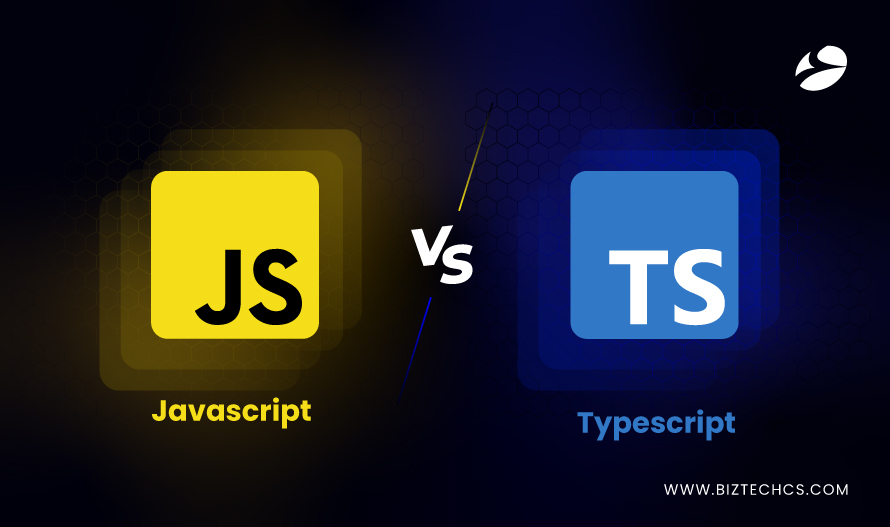699
The Ultimate Comparison of Typescript and Javascript - What You Need to Know
09 May, 2024
7 min read
699
09 May, 2024
7 min read
Table of content

Javascript or JS is a core web technology, a programming language that helps about 99% of websites with its client-side development. Typescript also is an open-source high-level programming language developed and introduced by Microsoft. It helps write codes for large-scale applications that are compiled into Javascript before being executed by browsers.
While both programming languages are popular with developers and are used widely for developing web applications, there are quite a few differences between the two that can make a difference in your website.
So, let’s compare the two languages before you hire Javascript developers for your web-based project!
Javascript or JS is a cross-platform programming language for the development of front-end and back-end web applications. It is primarily used for developing intuitive frontend features like interactive maps, search boxes, etc.
However, with the introduction of virtual engines like Node.js and Google V8, Javascript development can also be used to work seamlessly for server-side development.
Features:
Advantages:
Typescript is a high-level programming language that includes all the functionalities of Javascript in addition to features like interfaces, static typing, classes, and more. With Typescript, you get access to more advanced programming techniques and tools and create codes that run everywhere where JS is supported.
It is a statically typed language that is completely compatible with old to new Javascript versions. Typescript supports the concepts of OOP (object-oriented programming) such as class, objects, interfaces, inheritance, etc.
Features:
Advantages:
Now that you have a basic understanding of the two programming languages, let’s compare Typescript vs Javascript and learn the key differences.
| Javascript | Typescript | |
| Development Paradigm | It is used for developing web pages without strict type systems. | Typescript supports modern development paradigms such as object-oriented programming and strong typing for building Enterprise apps. |
| Learning Curve | The syntax is less strict and there are no mandatory type declarations, making the learning curve easy. | Even though it is JS-based, you still have to be familiar with the OOP concepts and types to work with Typescript. Thus, it has a steep learning curve. |
| Performance | The code is executed by the JS engine or on the server via frameworks like Node.js. | In Typescript also, the code is compiled into Javascript that is executed by the JS engine. So, there isn’t much of a difference in terms of performance. |
| Popularity | Javascript is undeniably one of the most used programming languages of today. | Typescript has gained immense popularity for enterprise app development and has even surpassed Javascript to be on rank #2, as per a Libhunt report. |
| Compatibility | It runs in the browser natively and on Node js servers. | Typescript applications can run anywhere Javascript is supported. |
| Error Checking | Here, the errors are detected during execution time | In case of Typescript, several potential errors can be found at the time of development and compilation. It reduces chances of errors at run time. |
| Tools | Good tool support with various IDEs and tools. | Superior tool support with advanced autocompletion, refactoring, and navigation features due to static typing. |
| Community | Extremely popular with a huge community. | Increasingly becoming popular but comparatively a smaller community. |
By now, you have checked the difference between Typescript and Javascript as a programming language. Let’s now learn the ideal places where you can use these two languages.
When comparing JS vs TS, you have to consider your project requirements and choose the technology accordingly. If you want to build a large-scale or complex application, Typescript helps with code maintenance and organization. Whereas, Javascript is a rather simpler yet efficient alternative that is widely chosen by businesses all over the world.
With this guide, you should be able to compare the two programming languages head-on and decide the suitable one for your project. Whether you are puzzled about choosing the right technology for your project and need consultation or want our Javascript developers to help with your project, we can assist in both.
Connect with our seasoned developers and seek help for your project immediately!
Netflix, Groupon, Microsoft, Paypal, LinkedIn, Facebook, and Trello are amongst other popular brands that use Javascript.
Typescript is commonly used for frontend development. However, it can be run on a Javascript runtime environment Node.js for backend development. Thus, it can be used for projects with full-stack development needs.
It completely depends on your specific project needs. If you are developing a rather complex and large-scale application, using a more organized language like Typescript can benefit you. Its advanced OOP concepts can help you develop efficiently in less time.
While there are multiple benefits of Typescript, its steep learning curve, complexity and overhead, runtime performance, and lack of compatibility with legacy systems could be dealbreakers.
There are certain things that you have to consider while working with Typescript. For instance, using the ‘any’ type for declaring variables as it defeats the purpose of strongly typed Typescript. Over complicating the types, not using latest features, poor use of union and intersection types are some of the other things to avoid in Typescript.
For some teams, especially in smaller projects or startups with rapid development cycles, the additional complexity and overhead of setting up and maintaining TypeScript can be seen as a burden. TypeScript requires type definitions, interface declarations, and sometimes more verbose coding patterns, which might slow down development in these fast-paced environments.

Development
Laravel
128
By Devik Gondaliya
22 Aug, 2024

Development
Devops
125
By Biztech
20 Aug, 2024

Javascript
248
By Devik Gondaliya
13 Aug, 2024